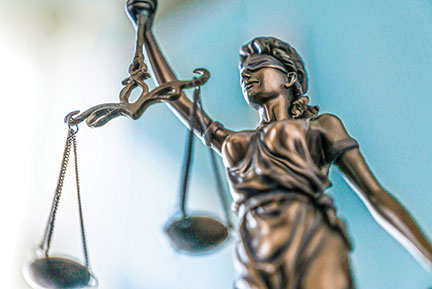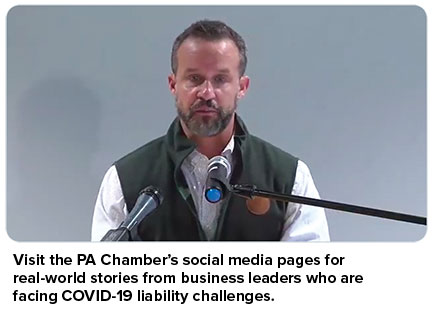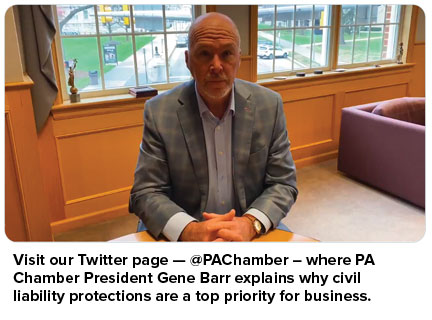By Curt Schroder
 As we begin 2021, Pennsylvania is still under siege from the COVID-19 virus. Business are meeting the challenge to fight this virus, but they need help from our state government. At the same time, lawyers are sharpening their knives in preparation for a wave of lawsuits against business, health care, schools, colleges and universities, child care centers, non-profits and others.
As we begin 2021, Pennsylvania is still under siege from the COVID-19 virus. Business are meeting the challenge to fight this virus, but they need help from our state government. At the same time, lawyers are sharpening their knives in preparation for a wave of lawsuits against business, health care, schools, colleges and universities, child care centers, non-profits and others.
The threat of lawsuits is real. In 2020, we saw businesses ask their employees and patrons to sign waivers to protect themselves in the event they get sued. In western Pennsylvania, the grocery store chain Giant Eagle was sued for requiring customers to wear masks, per the governor’s executive order. Long-term care facilities have been sued over the spread of COVID-19. Trial lawyers are advertising on television and the internet looking for plaintiffs to file suit against long-term care facilities, health care providers and businesses.
 Many businesses have also stepped up to re-tool and retrofit their facilities to produce personal protective equipment needed to stem the COVID-19 pandemic. These companies, both large and small, are incurring risks to provide needed life-saving equipment to those on the front lines of this pandemic. The risks they take today will protect health care workers and provide patients with equipment needed to ease their suffering and return them to health. Yet for all of their ongoing efforts to stem the pandemic, they too face increased exposure to liability.
Many businesses have also stepped up to re-tool and retrofit their facilities to produce personal protective equipment needed to stem the COVID-19 pandemic. These companies, both large and small, are incurring risks to provide needed life-saving equipment to those on the front lines of this pandemic. The risks they take today will protect health care workers and provide patients with equipment needed to ease their suffering and return them to health. Yet for all of their ongoing efforts to stem the pandemic, they too face increased exposure to liability.
Pennsylvania’s economic recovery will be inhibited if job creators are under the constant worry and threat of being sued by attorneys looking to place blame for COVID-19 exposure.
Businesses that follow health care guidance and requirements should not have to worry about being sued and potentially put out of business. Many businesses are understandably reluctant to fully re-open under these conditions.
 The Pennsylvania Coalition for Civil Justice Reform and the Pennsylvania Chamber of Business and Industry, along with numerous allies, worked with state Sen. Lisa Baker, R-Luzerne, to craft S.B. 1239 of 2020. This legislation provided safe harbor liability protection for businesses that follow government guidelines designed to limit the spread of COVID-19. Businesses would be protected from lawsuits alleging exposure to COVID-19 if they follow government health and safety precautions.
The Pennsylvania Coalition for Civil Justice Reform and the Pennsylvania Chamber of Business and Industry, along with numerous allies, worked with state Sen. Lisa Baker, R-Luzerne, to craft S.B. 1239 of 2020. This legislation provided safe harbor liability protection for businesses that follow government guidelines designed to limit the spread of COVID-19. Businesses would be protected from lawsuits alleging exposure to COVID-19 if they follow government health and safety precautions.
Near the close of legislative session last year, provisions within S.B. 1239 were amended into another bill — H.B. 1737 — and passed by the House and Senate. However, this huge legislative victory for business was short lived, as Governor Tom Wolf impaled the bill with his veto pen!
House Bill 1737 represented a targeted, tailored, and temporary measure to address the unique liability challenges faced by businesses during the pandemic.
Targeted
House Bill 1737 protected a number of entities who are struggling with a panoply of issues related to the pandemic, including increased liability exposure. Those entities include:
- business and government services — those entities permitted to operate under the governor’s emergency declaration and holding themselves out as open to members of the public;
- childcare facilities;
- health care providers — hospitals, long-term care facilities, doctors’ offices, emergency medical services;
- higher education institutions — including community colleges, state-owned and related-schools, and private colleges;
- schools — public schools, including charter schools and private schools;
- local governments; and
- personal protective equipment manufacturers, distributors, labelers and donors.
These entities have been hard hit by the pandemic. They deserve protection for their efforts to continue providing the valuable services we depend on despite the unprecedented conditions they face during this difficult time.
Tailored
Businesses and government services, childcare facilities, higher education, schools, and local governments would be protected from liability from actual or alleged exposure to Covid-19 unless they are shown to be grossly negligent or acting intentionally. If these entities are following public health directives, they could not be found to be grossly negligent and, therefore, liable. Public policy should protect those who are complying with government orders and directives during the pandemic. Many are struggling to stay in business as it is. The burdens of misguided litigation should not be heaped upon them.
Personal protective equipment donors, or those selling at cost, would not be held liable absent recklessness, willful misconduct or intentional infliction of harm. Other PPE manufacturers, distributors and labelers are protected unless they act in a grossly negligent manner, willfully or intentionally inflicted harm. And they must be in accord with manufacturing standards in effect prior to the emergency declaration.
Health care providers received several needed protections. They would not be held liable, absent a finding of gross negligence, recklessness, willful misconduct or intentional harm for:
- treatment or testing of COVID-19 patients;
- an act or omission caused by a shortage of equipment, supplies or personnel;
- harm directly resulting from the demand for testing and treatment of Covid-19 that was beyond the reasonable control of the provider; and
- compliance with public health directives regarding the testing and treatment of COVID-19.
Providers would also be protected from liability if they complied with public health directives.
Temporary
The safe harbor protections found in H.B. 1737 would only apply during Governor Tom Wolf’s proclamation of disaster emergency.
Other States Have Stepped Up
Governor Wolf, in his veto message, erroneously claimed the bill was “overreaching,” and that it protected non-compliance with public health orders. He also claimed the bill shielded entities from liability in a broad fashion inviting “potential for carelessness and a disregard for public safety.” All of those statements are contradicted by the expressed provisions of the bill.
Governor Wolf’s veto is particularly disturbing because 21 states and the District of Columbia have enacted COVID-19 liability protections with similar or some combination of the protections found in H.B. 1737. Other states have executive orders much more comprehensive and robust than Governor Wolf’s order earlier this year, giving liability protection only to health care workers working in hospitals.
Pennsylvania is an outlier in failing to protect those soldiering through the pandemic and hoping to survive economically until vaccines help us turn the corner. The sad part is that just as businesses think they might have survived the pandemic, the lawsuits waiting to be filed will again threaten their very viability and survival.
Curt Schroder is executive director of the Pennsylvania Coalition for Civil Justice Reform, a nonpartisan advocacy organization comprised of a diverse group of organizations and individuals committed to bringing fairness to Pennsylvania’s courts by raising awareness of civil justice issues and advocating for legal reform. Visit www.paforciviljusticereform.org to learn more.